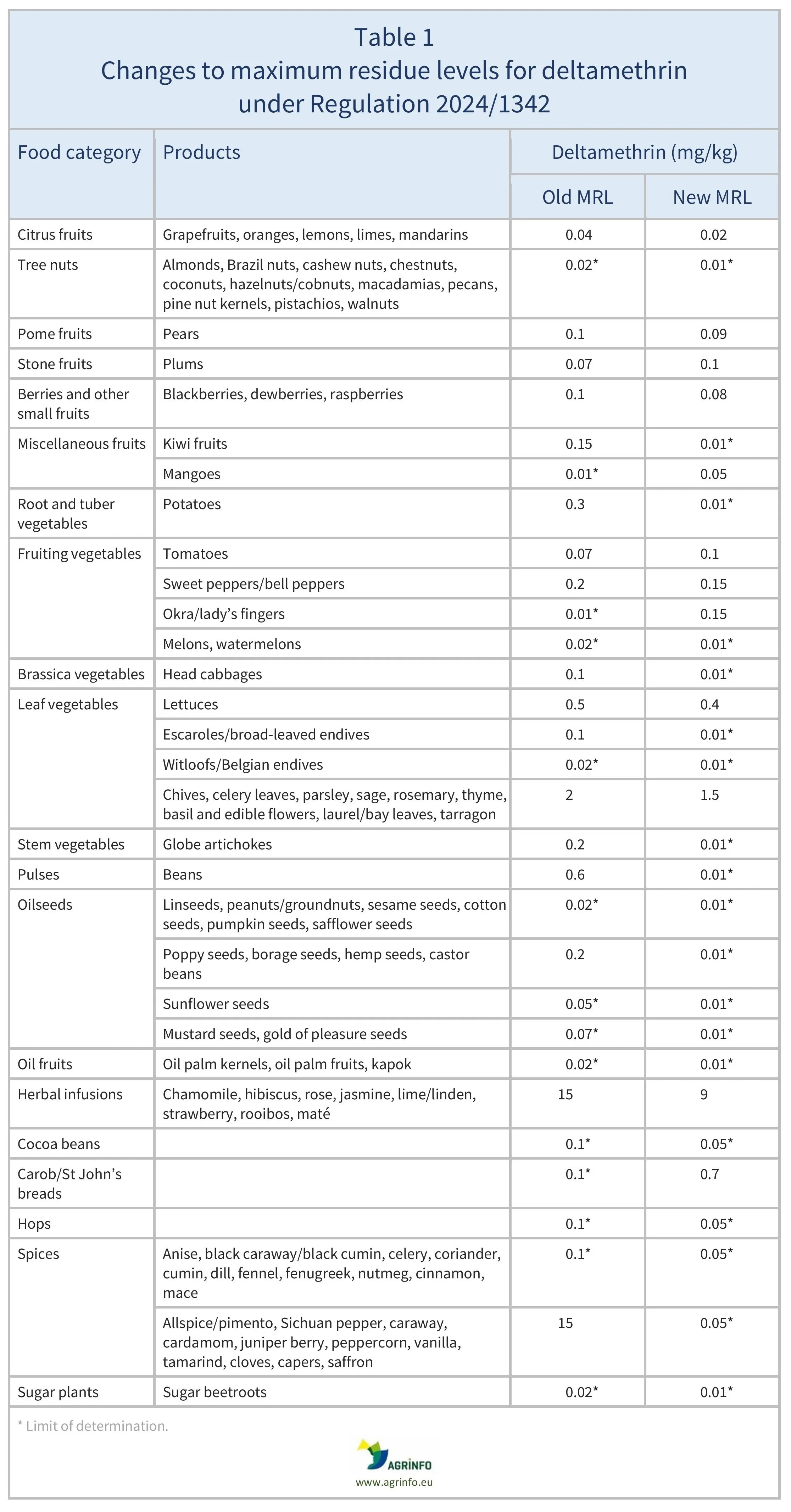Maximum residue levels for deltamethrin
- Food safety
- Pesticide MRLs
- Pesticides
Summary
The European Union (EU) has raised the maximum residue level (MRL) for deltamethrin on papayas, in line with the Codex Alimentarius MRL (CXL) adopted in 2024.
EU raises deltamethrin MRLs on papayas in line with Codex standards
Commission Regulation (EU) 2025/1164 of 13 June 2025 amending Annexes II and III to Regulation (EC) No 396/2005 of the European Parliament and of the Council as regards maximum residue levels for cyantraniliprole, cyflumetofen, deltamethrin, mefentrifluconazole, mepiquat and oxathiapiprolin in or on certain products
Update
The European Union (EU) has raised the maximum residue level (MRL) for deltamethrin on papayas, in line with the Codex Alimentarius MRL (CXL) adopted in 2024.
Impacted Products
Citrus fruits, grapefruits, oranges, lemons, limes, mandarins, tree nuts, almonds, Brazil nuts, cashew nuts, chestnuts, coconuts, hazelnuts/ cobnuts, macadamias, pecans, pine nut kernels, pistachios, walnuts, pears, plums, blackberries, dewberries, raspberries, kiwi fruits, mangoes, papayas, potatoes, tomatoes, sweet peppers/ bell peppers, okra/ lady’s fingers, melons, watermelons, head cabbages, lettuces, escaroles/ broad-leaved endives, witloofs/ Belgian endives, chives, celery leaves, parsley, sage, rosemary, thyme, basil and edible flowers, laurel/ bay leaves, tarragon, globe artichokes, beans, oilseeds, linseeds, peanuts/ groundnuts, sesame seeds, cotton seeds, pumpkin seeds, safflower seeds, poppy seeds, borage seeds, hemp seeds, castor beans, sunflower seeds, mustard seeds, gold of pleasure seeds, oil palms kernels, oil palms fruits, kapok, chamomile, hibiscus, rose, jasmine, lime/ linden, strawberry, rooibos, maté, cocoa beans, carobs, hops, spices, anise, black caraway/ black cumin, celery, coriander, cumin, dill, fennel, fenugreek, nutmeg, cinnamon, mace, allspice/ pimento, Sichuan pepper, caraway, cardamom, juniper berry, peppercorn, vanilla, tamarind, cloves, capers, saffron, sugar beetroots
What is changing?
The EU has raised the MRL for deltamethrin on papayas from 0.1 to 0.2 mg/kg.
Why?
The EU MRL is aligned with the new CXL adopted in November 2024 (CAC 2024). The EU aligns MRLs with CXLs where they are not considered to be a concern for consumer safety.
Previous changes to deltamethrin MRLs are listed in Table 1.
Timeline
The new MRL for papayas applies from 6 July 2025.
Previous changes to MRLs, listed in Table 1, have applied since 11 December 2024.
Background
In 2024, the MRLs for deltamethrin were lowered to the limit of determination (LOD) of 0.01–0.05 mg/kg on kiwi fruits, potatoes, cabbages, escaroles, globe artichokes, oilseeds, and spices (Regulation 2024/1342; see Table 1). (The LOD is the lowest level that can be detected using the most modern and reliable analytical methods.)
MRLs are set in accordance with the rules set out in Regulation 396/2005. For information on current MRLs for other substances, please consult the EU Pesticide Residues database.
Resources
CAC (2024) Report of the 55th Session of the Codex Committee on Pesticide Residues, Chengdu, Sichuan Province, P.R. China, 3–8 June 2024. Joint FAO/WHO Food Standards Programme, Codex Alimentarius Commission.
Commission Regulation (EU) 2024/1342 as regards maximum residue levels for deltamethrin, metalaxyl, thiabendazole and trifloxystrobin in or on certain products
Corrigendum to Commission Regulation (EU) 2024/1342 as regards maximum residue levels for deltamethrin, metalaxyl, thiabendazole and trifloxystrobin in or on certain products
Sources
Commission Regulation (EU) 2025/1164 as regards maximum residue levels for cyantraniliprole, cyflumetofen, deltamethrin, mefentrifluconazole, mepiquat and oxathiapiprolin in or on certain products
Tables & Figures

Source: based on Regulation 2024/1342
Disclaimer: Under no circumstances shall COLEAD be liable for any loss, damage, liability or expense incurred or suffered that is claimed to have resulted from the use of information available on this website or any link to external sites. The use of the website is at the user’s sole risk and responsibility. This information platform was created and maintained with the financial support of the European Union. Its contents do not, however, reflect the views of the European Union.
EU raises deltamethrin MRLs on papayas in line with Codex standards
Commission Regulation (EU) 2025/1164 as regards maximum residue levels for cyantraniliprole, cyflumetofen, deltamethrin, mefentrifluconazole, mepiquat and oxathiapiprolin in or on certain products
What is changing and why?
The European Union (EU) has raised the maximum residue level (MRL) for deltamethrin on papayas in line with the Codex MRL (CXL) adopted in 2024.
Timeline
The new MRL for papayas applies from 6 July 2025.
Previous changes to MRLs, listed in Table 1, have applied since 11 December 2024.
Tables & Figures

Source: based on Regulation 2024/1342
Disclaimer: Under no circumstances shall COLEAD be liable for any loss, damage, liability or expense incurred or suffered that is claimed to have resulted from the use of information available on this website or any link to external sites. The use of the website is at the user’s sole risk and responsibility. This information platform was created and maintained with the financial support of the European Union. Its contents do not, however, reflect the views of the European Union.
